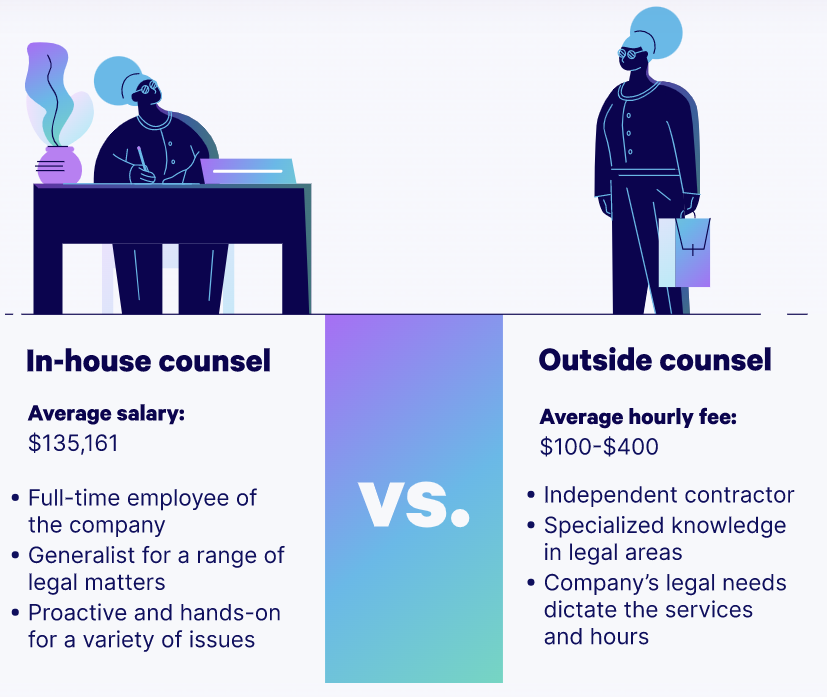
In today’s complex and dynamic business environment, companies face a myriad of legal challenges that require expert guidance and strategic counsel. As a result, the demand for in-house legal counsel in corporate legal departments is rapidly increasing. In this article, we will explore the growing need for in-house legal counsel and how they play a crucial role in managing legal risks and driving business success.
Strategic Business Partners: In-house legal counsel are no longer just legal advisors, but strategic business partners. They work closely with senior management and other departments to provide proactive legal advice that aligns with the company’s strategic objectives. They are involved in critical decision-making processes, such as mergers and acquisitions, contract negotiations, intellectual property management, and regulatory compliance, to ensure that legal risks are effectively managed and the company’s interests are protected.
Deep Industry and Company Knowledge: In-house legal counsel possess a deep understanding of the company’s industry and operations, which is invaluable in providing specialized legal advice. They are familiar with the company’s business model, products, services, and corporate culture, which enables them to provide tailored legal solutions that address the specific needs and challenges of the company. This industry and company knowledge allows them to provide more effective and efficient legal support compared to external counsel who may lack this context.
Cost-Effective Legal Management: Hiring in-house legal counsel can be a cost-effective strategy for companies, especially those with a significant volume of legal work. In-house counsel can handle day-to-day legal matters, such as contract review, compliance issues, and employment matters, which would otherwise be outsourced to external law firms at a higher cost. In-house counsel can also work closely with external law firms to manage legal costs and negotiate favorable fee arrangements, resulting in more cost-efficient legal management for the company.
Faster Response Time: In-house legal counsel are readily available to provide immediate legal advice and support, which can be critical in fast-paced business environments. Companies often face time-sensitive legal issues that require prompt action, such as responding to regulatory inquiries, managing litigation, or addressing contractual disputes. Having in-house counsel allows companies to have a faster response time and make informed decisions promptly, reducing potential legal risks and minimizing business disruptions.
Risk Management and Compliance: Legal and regulatory compliance is a top priority for companies, and in-house legal counsel play a crucial role in managing legal risks and ensuring compliance with applicable laws and regulations. They develop and implement policies and procedures to mitigate legal risks, conduct internal investigations, and provide guidance on regulatory compliance matters. In-house counsel also work closely with other departments, such as finance, human resources, and risk management, to ensure that the company’s operations are in compliance with relevant laws and regulations, minimizing potential legal liabilities.
Business-Specific Contract Management: Contracts are an essential part of every business, and in-house legal counsel are responsible for managing and negotiating contracts on behalf of the company. They review, draft, and negotiate contracts to ensure that they are legally sound and align with the company’s strategic objectives. In-house counsel also work with business teams to identify and mitigate contractual risks, negotiate favorable terms, and ensure that the company’s interests are protected in contractual relationships. This business-specific contract management expertise is a valuable asset for companies to effectively manage their contractual obligations and minimize potential legal disputes.
Legal Innovation and Efficiency: In-house legal counsel are at the forefront of legal innovation, leveraging technology and process improvements to enhance legal operations and drive efficiency. They implement legal technology tools, such as contract management software, eDiscovery platforms, and legal research databases, to streamline legal processes, automate routine tasks, and improve legal service delivery. In-house counsel also develop and implement standardized legal templates, playbooks, and processes to ensure consistency



